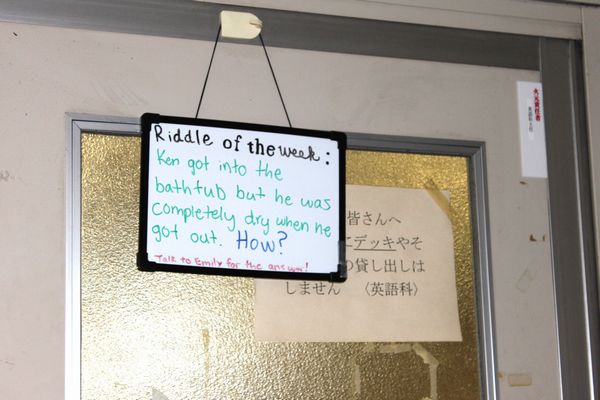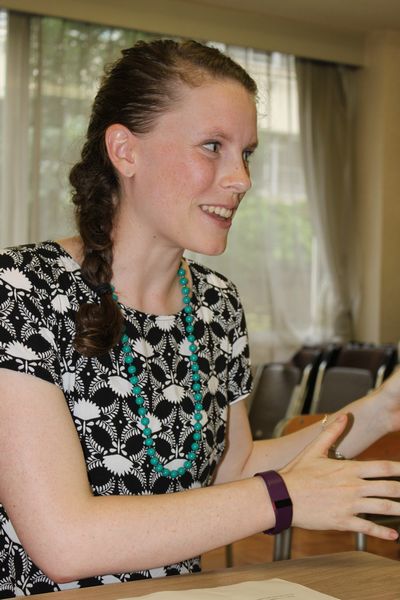JETs try out traditional Japanese culture through extracurriculars!
Communicating with students through 'riddles'
What is your impression of Japanese high school students?
Ms. Emily:
The students at Fuji Senior High School are some of the hardest-working I've ever seen. Be it lessons or school club activities, culture festivals or sports festivals, the students support each other and absolutely love their school.
What sort of things have you devised to promote communication with your students?
Ms. Emily:
"Riddles" I post outside of the teacher's room every week, and lunchtime. By coming to give their solutions to the questions I pose, even shy students have an opportunity to come and talk to me.

On this day, the following "riddle" was published:
"Riddle of the week:
Ken got into the bathtub but he was completely dry when he got out. How?"
Ms. Emily:
Taking advantage of the riddle, many students have started coming to the teacher's room to talk to me. In addition to that, I spend lunchtime with the students. By speaking in English, it's an opportunity for me to use English outside of the classroom, and the students take part in making an environment where they can speak naturally in English.
What is the key point to let Japanese students speak English?
Ms. Emily:
At any rate, just use English. Read English books, watch English news programs or movies, and speak English with your friends. Also, try talking to a native speaker instructor without fear. Doing so lets you learn lots of things, and you'll be able to truly understand English.
A chance to experience a different culture through the JET Program
Why did you want to become a JET?
Ms. Emily:
I studied education in university, and I wanted not just to visit another country, but to really immerse myself in a culture other than my own. I've been particularly interested in Japanese culture, and when I was thinking I wanted to live in Japan, I learned about the JET Program. I thought it to be the perfect program to teach English to Japanese students, and to learn about Japan through my own eyes, so I decided to apply.
What do you find interesting about acting as a JET?

Ms. Emily:
There are a few things, but first and foremost is learning about the similarities between Japanese and American schools. Also, through the unique questions I get from Japanese teachers and students, I get opportunities to think about my own language (English) in a way I'd never considered up to now. Of course, I enjoy joining in on club activities with the students, and I think getting to eat food I never knew about in school lunches is a good experience.
How has the post-arrival JET training you received been useful in the field?
Ms. Emily:
When I first came to Japan I knew absolutely nothing about Japanese students. But through the training I was able to learn what was expected of me in classes, and ways to draw out the maximum results.
How has the JET teaching ability improvement training been useful to you?
Ms. Emily:
The most useful part of it was getting to speak with other JETs to share ideas and information.I use both in my lessons.
In conclusion, would you please offer a message to aspiring JETs out there?
Ms. Emily:
JET is the best opportunity to experience a culture outside of your own.Open your heart, open your mind to accepting a diverse array of values, and try taking on new experiences!


